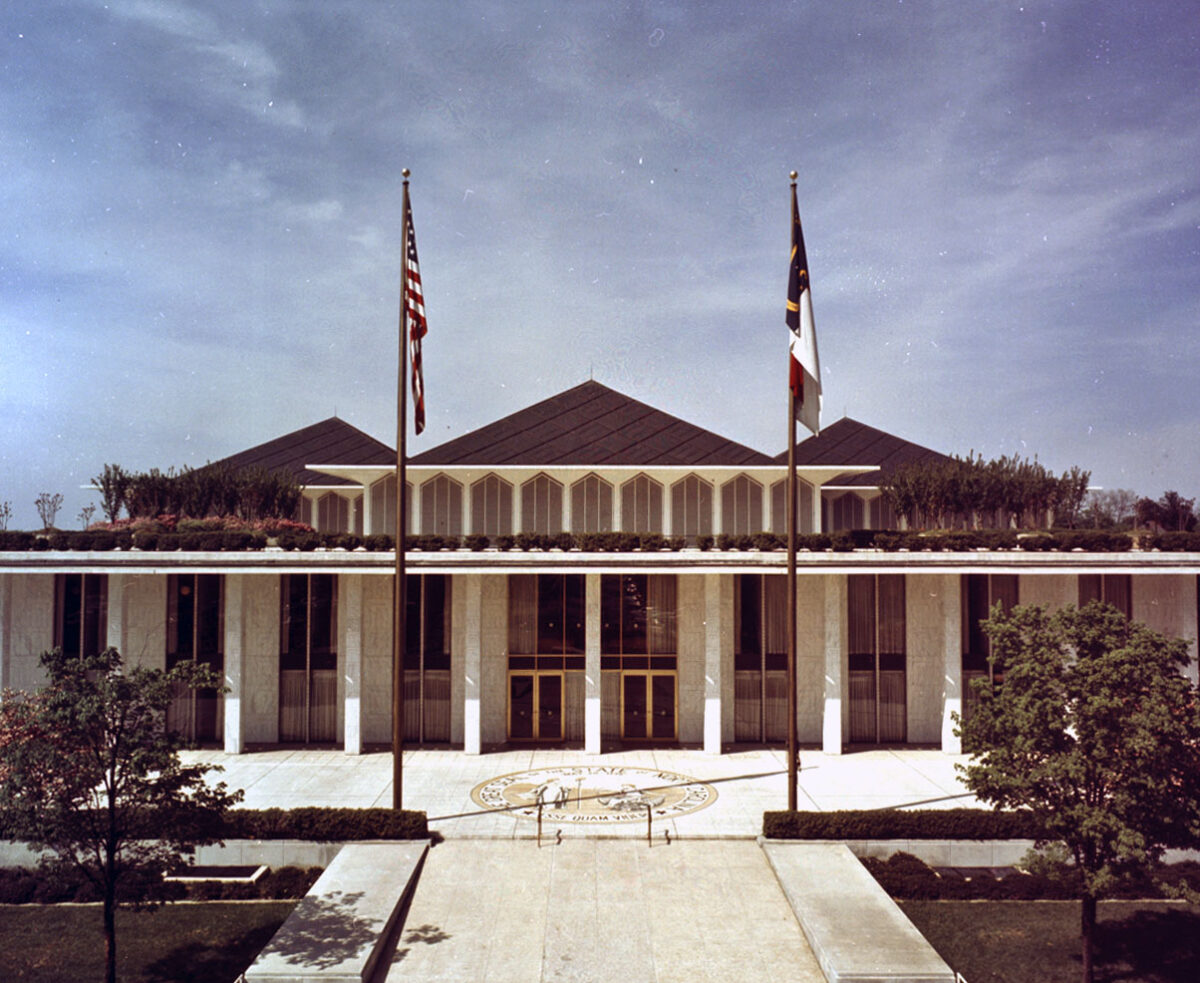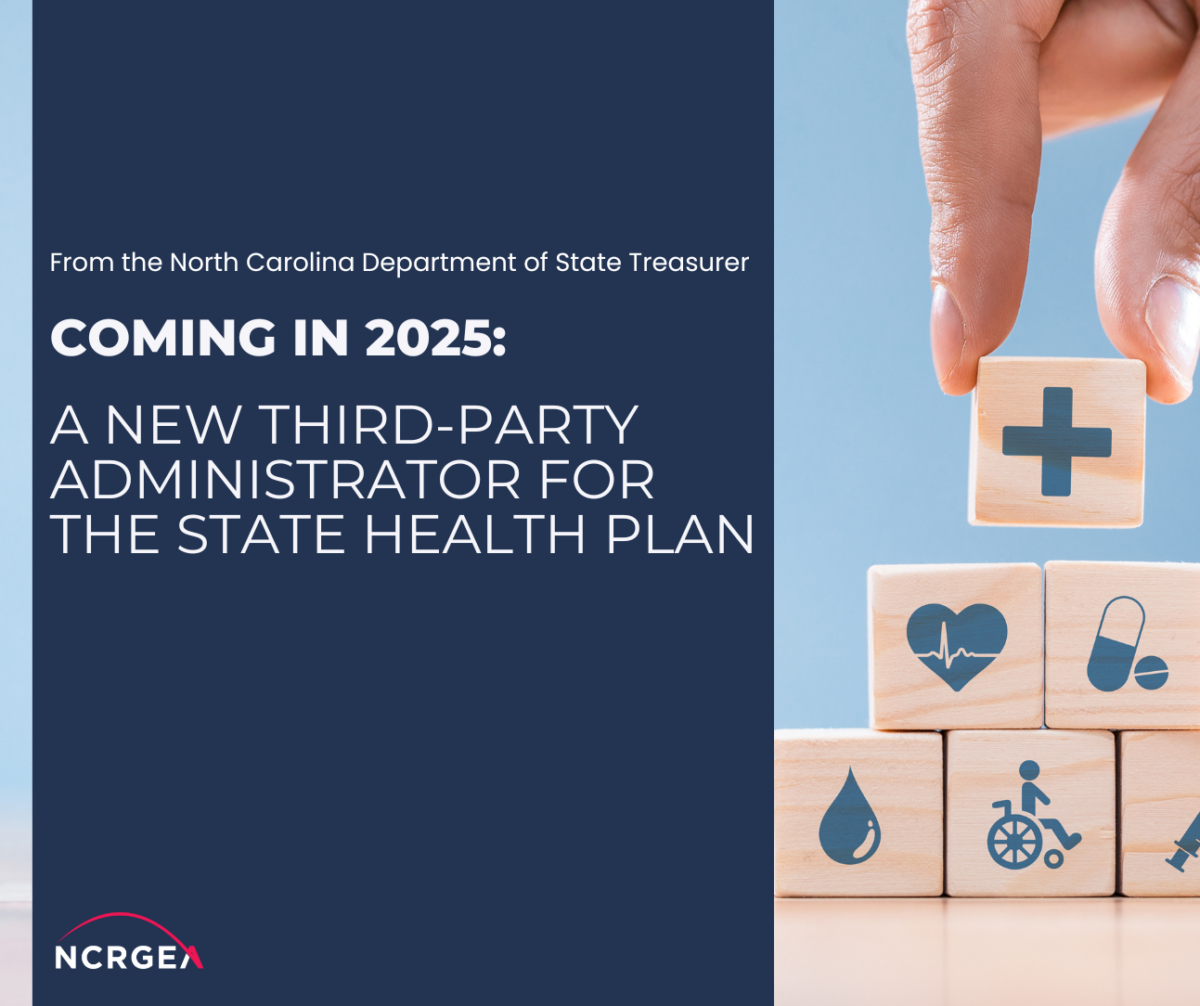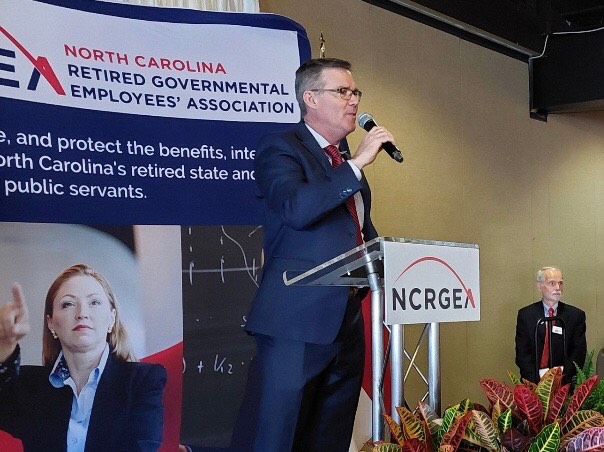$500 Travel Giveaway Winner Announced: Local Government Retiree
Congratulations to the winner of our $500 Travel Giveaway. Lesha West retired in 2014 from the Cabarrus County Department of Social Services. Prior to that, she was with the Rowan County Department of Social Services. We hope she enjoys a wonderful trip in 2023!

Win $500 Toward Travel. Deadline is January 3, 2023!
Whether sand and waves or a view of the Eiffel Tower, here’s a chance to earn $500 toward travel to your dream destination in 2023. You do not need to be a member to win. Use the QR code or visit bit.ly/ncrgeagiveaway to enter the giveaway.

Plan Now to Successfully Set Your New Year’s Resolutions
Need help setting your New Year’s resolutions?
Many of us decide what our New Year’s resolutions will be sometime in December, normally when someone asks us if we are going to make any and what they are. It’s normally a spur-of-the-moment decision. This is a contributing factor as to why we normally break them so quickly.
A study conducted by OnePoll in conjunction with Crispy Green in 2020 found a self-aware lack of discipline (52%), followed by busy schedules and lacking the proper time to see them through (43%) are the top three reasons people gave for breaking their resolutions.
Two in five also point to societal and peer pressure as a big reason for their resolutions
are cut short.
But with better planning, you can set targets that are more suited to you and your needs. Let’s go over some yearly goals examples and how you can achieve them.
New Year’s is undoubtedly the most popular time to set your annual target.
From a psychological standpoint, it makes sense. The holiday offers a clear breaking point from the previous 12 months. It gives a sense of new beginnings, opening the door to more possibilities.
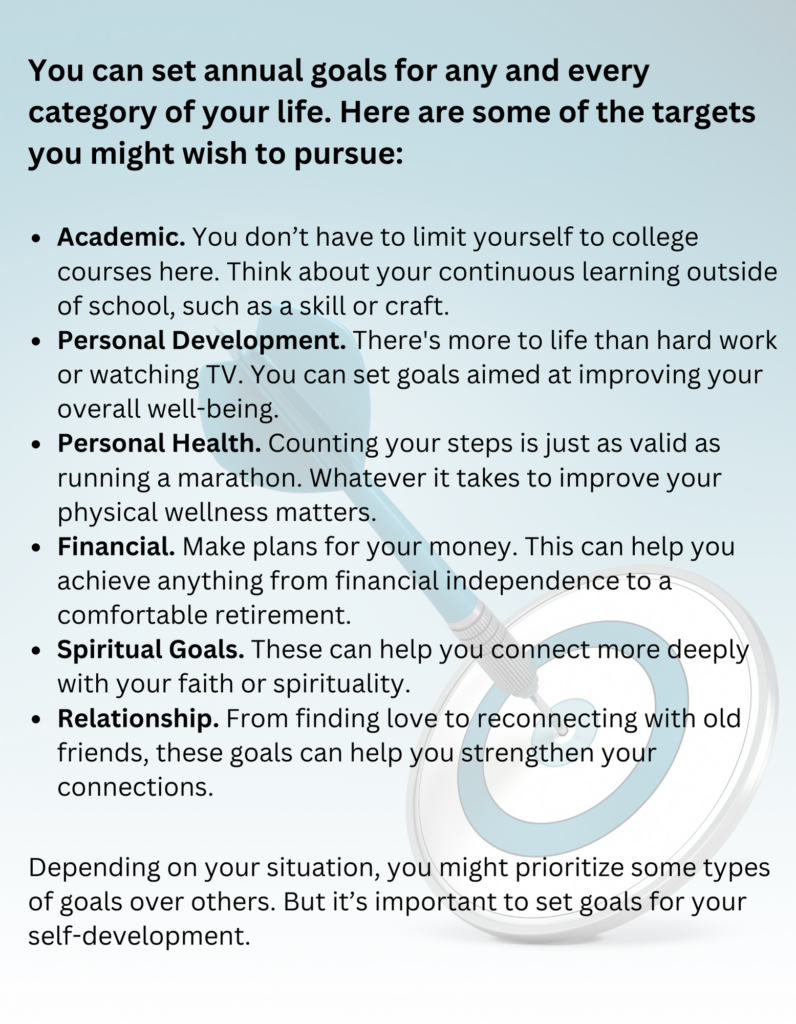
It’s tempting not to bother with setting annual goals. But they come with many benefits. Here are a few to consider before you rule them out.
They give you direction.
If you’ve ever felt stuck, goals are a way to pull yourself out. The best yearly goals give you something to strive for, pointing you toward success.
They allow you to track your progress.
Whether you’re aware of it or not, you’re always learning and moving forward. But you won’t notice your progress if you’re not paying attention. Goals give you a way to see how far you’ve come.
They help you stay accountable.
How many times have you told yourself, “I should really work out more.” Great! Let’s hold you to that. When you create goals, your lofty dreams become real. The next logical step is to take action. Looking at an unchecked “workout” box on your to-do list will remind you to keep working.
They keep you motivated.
Every time you achieve a goal, it’s a win. That deserves celebration. And every time you reward yourself, you boost your energy and build your motivation to keep going.
They halt procrastination.
A goal has a clear deadline. This forces you to plan accordingly and take the necessary steps to succeed.
They help you figure out what you want.
Without a clear target, it’s easy to never commit to a project. Setting a goal forces you to focus on what’s important.
No matter what you’re setting your goals for, here are some tips on how to do it effectively.
- Think about what you want. Be specific with what you want to accomplish. As you think about it, here are some questions to ask yourself:
- What do I want out of life?
- What kind of family life do I imagine?
- What are my career aspirations?
- What would I regret not doing before I die?
- These types of questions will point you in the right direction. They will help you visualize your ideal life to start striving for it.
- Be SMART about achieving your goals. Now that you have a direction, make SMART goals. SMART is an acronym for targets that are:
- Specific: you know exactly what you want to accomplish
- Measurable: you have a clear metric for measuring success
- Achievable: you’re able to accomplish your goal with your current skills and resources
- Relevant: your goal connects to your wider lifetime ambitions
- Time-bound: you have a clear time frame for achieving your goal
- Start small. Set smaller milestones that inch you toward your larger goal. Each should have clear deadlines to stay on task throughout the year. If you can’t accomplish it within the year, split it into several short-term goals.
- Tell your loved ones about your ambitions. You don’t need to broadcast your goals to the world. But if you tell even a handful of people, they’ll feel much more real. Also, if you’re ever feeling lost, they can remind you why you took on this challenge in the first place. They can also provide valuable feedback on how you’re doing.
- Re-evaluate your goals often. A lot can change in a year. A few months from now, you may want very different things than you do currently. Re-evaluating your goals will help ensure you’re always heading in the right direction.
- Reward yourself at each step. This means finding your “carrot” to celebrate a milestone. It could be a chocolate bar after a run or a day off after writing. Every time you reward yourself, you reinforce the habit of achieving your goals.
- Put your goals somewhere visible. Stick your list of goals to your bathroom mirror. Set them as your phone wallpaper. Tattoo them on your arm (okay, maybe don’t do this one). Whatever it is, make sure you can see and remind yourself of your goals every day.
- Believe in yourself. There will be bumps on your journey. But, as with most things in life, they’ll pass. It’s important to believe in your ability to overcome obstacles. Trust that you can achieve whatever you set your mind to.
So what are good goals to set? Here are some goal ideas for every area of your
life:

Academic Goals
- Research where you can take a class on what interests you and see if there’s financial aid available
- Take a class
- Read a nonfiction book about what interests you
- On the internet, Google “how to” videos
Personal Goals
- Spend less time watching TV
- Define your personal beliefs and values
- Start a new hobby
Personal Health Goals
- Wake up earlier
- Exercise three times a week
- Socialize more
Financial Goals
- Meet with a financial advisor or your banker to review your finances
- Consolidate your financial statements in one location so loved ones can
easily find them in case something unexpected happens to you.
Spiritual Goals
- Read the central texts of your religion
- Meditate for 20 minutes every day
- Take part in your religious community
Relationship Goals
- Learn a new skill together
- Go on more frequent dates
- Spend more time with your friends
Final thoughts
Pursuing a yearly goal is difficult. That’s a fact. But with a bit of planning, you can set yourself up for success. Doing so will pay you back in dividends. You’ll set yourself on a path of personal
growth and find new motivation every step of the way.
NCRGEA Executive Director Quoted in Op-Ed Article About Current Shortage of Public Servants
“They can’t keep people”: There’s a critical shortage of public employees in NC
News & Observer, December 1, 2022, by Ned Barnett
Callers to the Social Security office are put on a seemingly endless hold.
Callers to a state Department of Motor Vehicles office in Raleigh often get the message: “Your called party is temporarily unavailable. Please try again later.”
Cities and towns across the nation have closed city pools for lack of lifeguards, while school systems are canceling bus pickups for lack of drivers.
The COVID pandemic has aggravated a worker shortage across the U.S. economy, but it’s hitting public employees especially hard.
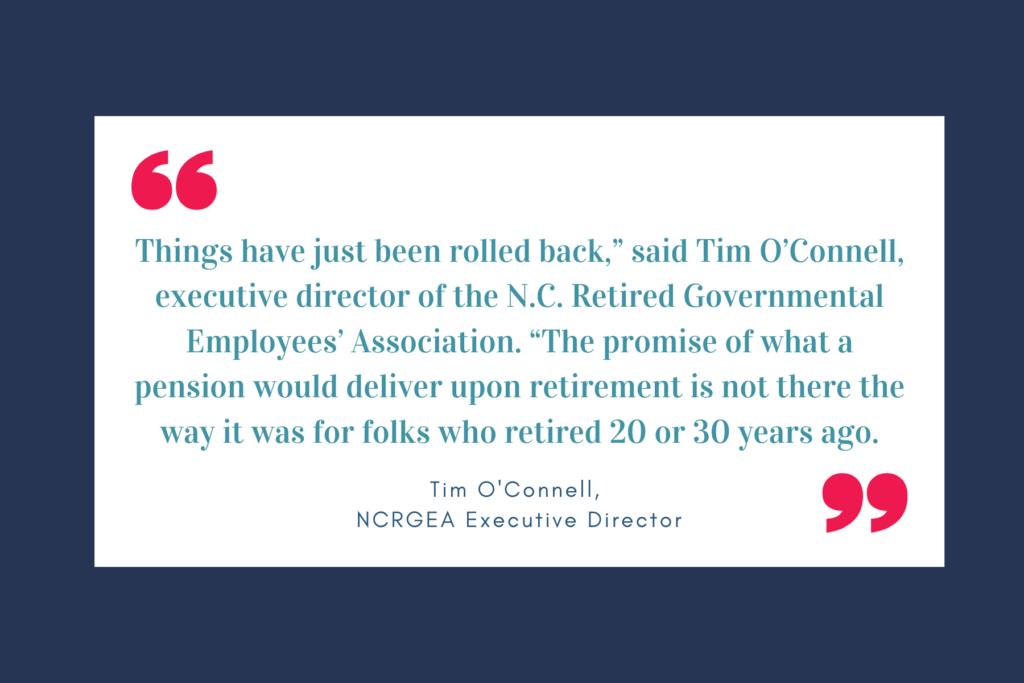
“At the local level, governments are pulling out all the stops to get people,” said Leisha DeHart-Davis, a professor of public administration and government at the UNC School of Government. “The status quo no longer works for retaining and securing people.”
A UNC survey of local government employees found that 23 percent of them were planning to leave their job, up from 15 percent before the pandemic.
The pandemic’s disruptions and rising private sector wages have accelerated the loss of government workers, but the roots of the problem go deeper. Republicans have been pushing back against the value of public employees at least since President Ronald Reagan fired 11,000 striking air traffic controllers in 1981. Benefits have been pared back, pensions have lost ground to inflation and fewer young people are drawn to public service.
In North Carolina, legislation passed in 2017 eliminated retiree health benefits for state employees and teachers hired after 2020. Meanwhile in the past 10 years, retired state employees’ cost of living allowance (COLA) totaled only 2% and Local Government Employee’s COLA in the same period has increased by less than 1%.
“Things have just been rolled back,” said Tim O’Connell, executive director of the N.C. Retired Governmental Employees’ Association. “The promise of what a pension would deliver upon retirement is not there the way it was for folks who retired 20 or 30 years ago.”
As benefits shrink and private sector wages rise, the state government is struggling to attract and keep workers who provide both basic and essential services.
State agencies are reporting vacancy rates as high as 20, 30 and 40 percent. DMV Commissioner Wayne Goodwin has boosted starting salaries for drivers license examiners, but it’s not enough to fill gaps.
Beyond wages, Goodwin said, his employees are burdened by filling in for missing workers and a sense that their public service is not valued. “We do hear in exit interviews that they don’t feel like they are getting respect from the public,” he said. “It can be a stressful job.”
Even at the federal level, once the gold standard for public employee pay and benefits, eroding pay, short staffing and low morale are inhibiting the delivery of services.
Valerie Langley, a 31-year Social Security Administration employee based in Charlotte, said her office’s traffic has fallen from 78 employees prior to the pandemic to 64 even as the population served has increased sharply. “They can’t keep people,” she said.
The union representing Social Security employees, the American Federation of Government Employees (AFGE), said the agency nationally has 4,000 fewer field office and teleservice center employees than it did 12 years ago. Meanwhile, the number of Social Security beneficiaries has risen by 21 percent since 2010.
Langley, a union steward, said the public blames employees when the phone isn’t answered or employees are late to appointments. “That’s the stereotype – lazy government workers,” she said. “It’s honestly the exact opposite. We’re overworked and overwhelmed.”
For too long, Republican lawmakers have neglected raising wages for public employees, enhancing benefits or modernizing government workplaces. Now that neglect has converged with the Great Resignation. Elected officials all levels are going to have to answer why taxpayers seeking services are instead getting busy signals, long lines and extended delays.
Reposted with permission from Associate Opinion Editor Ned Barnett. Read more at: https://www.newsobserver.com/opinion/article269329472.html#storylink=cpy




